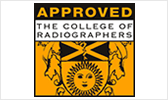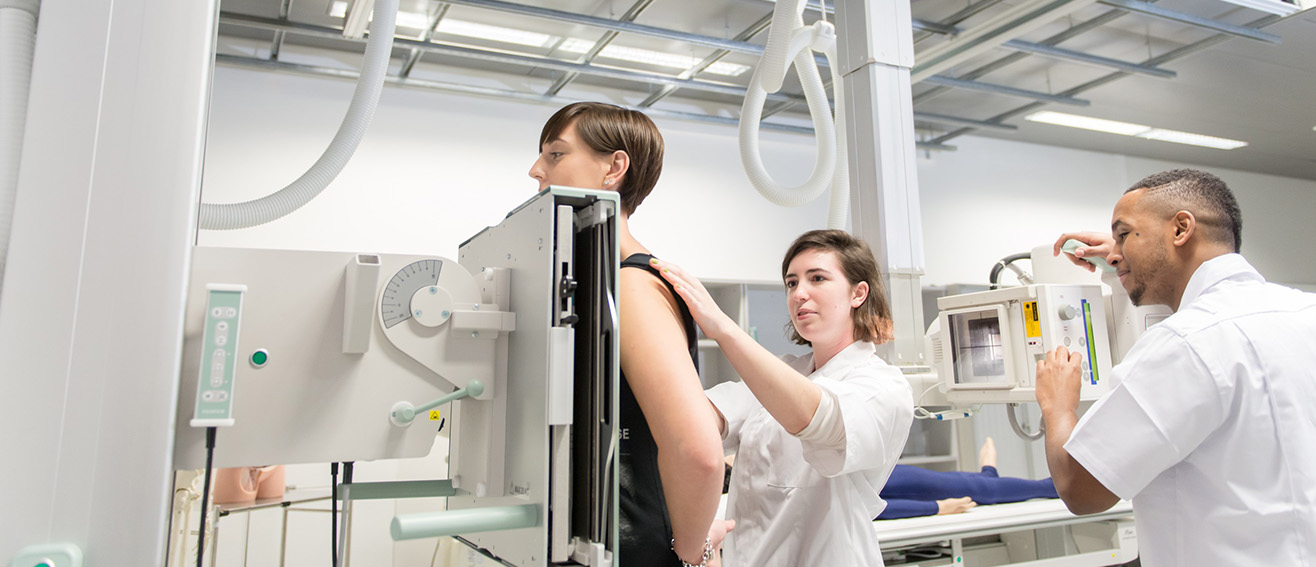Overview
Image is everything
If you’d like to gain the knowledge and skills to practice as an assistant practitioner in the diagnostic imaging department, this course is the place to start. The DipHE Diagnostic Imaging course combines teaching practical skills with underpinning theory so that you'll be competent in a range of clinical settings. The course aims to develop confident and competent practitioners who practice compassionately, skillfully and safely while maintaining dignity and promoting health and wellbeing.
Why Diagnostic Imaging at LSBU?
- check-circle
- A professional accreditation – approved by the Health and Care Professions and accredited by the Society and College of Radiographers.
- heart
- LSBU were named winners of the "Diagnostic Radiography Course of the Year" at the 2022 Radiology Awards
- link
- Clinical work placement opportunities at some of London's world-renowned hospitals, with opportunities including Guy's and St Thomas' NHS Foundation Trust, King's College Hospital and Great Ormond Street Hospital
- link
- Specialist facilities including our Digital Diagnostic X-ray Room and the Digital Interpretation Lab
- medkit
- LSBU Health and Social Care graduates are the second highest paid amongst all London Modern university graduates, and the sixth highest in the UK one year after graduating (DfE LEO data 2022).
| ModeFull-time | Duration2 years | Start dateSeptember | Application code4292 | Application method Direct to LSBU |
Location
London South Bank University student union is located at 103 Borough Rd, London SE1 0AA.
If you are visiting our Southwark Campus, you may wish to use our downloadable campus map (PNG File 466 KB). For information on accessibility, see our DisabledGo access guides. See our location page for more details.
Entry Level Requirements
Want to start your course this September? call 0800 923 8888 for entry requirements.
We expect applicants will come from a variety of academic backgrounds, but you will need to meet the following entry criteria:
- A Level BBB in Science or;
- BTEC National Diploma DDD in Science or professionally relevant subject or;
- Access to HE Diploma in Science or similar with 30 Distinctions of which 18 must be in Science or;
- Equivalent level 3 qualifications also considered
- Applicants must hold 5 GCSEs A-C including Maths, English and Science or equivalent (reformed GCSEs grade 4 or above).
Additional entry requirements
- All Applicants must be 18 years or over at the commencement of the course
- Satisfactory outcome at interview
- Provide satisfactory references
- Occupational health clearance
- Enhanced Disclosure Barring Service (DBS)
- Proof of ordinary residency
- A valid passport required for enrolment purposes
English language
Those whom English is not their first language must achieve a minimum score of 7.0 overall or equivalent with not less than 7.0 in the listening and reading sections and not less than 7.0 in the writing and speaking sections for the International English Language Test Score (IELTS) at the time of application.
Interview
If your initial application to a Health and Social Care course is successful, you’ll be invited for an interview.
Visit our interview page for information on preparing for the day and what to bring.
Advanced entry
If you have already completed some studies at another university, we may be able to consider you for advanced entry. Please see our advanced entry page for more information.
Foundation Year
If you have been out of study for a considerable amount of time or have slightly missed the entry requirements this course, you can take your first steps to becoming a registered practitioner with our Health and Social Care Foundation year. Boost your qualifications and confidence for further study with this one-year introductory course and on completion of this course you will be guaranteed entry on to one of our 13 health BSc pre-registration health and social care degrees.
Attributes and values
Personal qualities and values in line with those expected by the NHS constitution.
Choose your country
Select country here:
Missing English and Maths qualifications?
If you do not have the required English and Maths qualifications needed to satisfy the entry requirements for this programme, we have courses available at our partner College that you can take to upskill in these areas. Find out more at South Bank College.
Advanced entry
If you have already completed some studies at another university, we may be able to consider you for advanced entry. Please see our advanced entry page for more information.
United Kingdom
£9535
Tuition fees for home students
International
£17600
Tuition fees for international students
Tuition fees are subject to annual inflationary increases. Find out more about tuition fees for Undergraduate or Postgraduate courses.
-
Full-time
full-time
DipHE Diagnostic Imaging (FT) - Year 1
UK fee: £9535 International fee: £17600 AOS/LSBU code: 4292 Session code: 1FS00 Total course fee: * The full amount is subject to fee increases, the total shown below is based on current fees.
UK: £19070 International: £35200 DipHE Diagnostic Imaging (FT) - Year 2
UK fee: £9535 International fee: £17600 AOS/LSBU code: 4292 Session code: 2FS00 Total course fee: * The full amount is subject to fee increases, the total shown below is based on current fees.
UK: £19070 International: £35200
For more information, including how and when to pay, see our fees and funding section for undergraduate students.
Please check your fee status and whether you are considered a Home, EU or International student for fee-paying purposes and for our regulatory returns, by reading the UKCISA regulations.
See our Tuition Fees Regulations (PDF File 391 KB) and Refund Policy (PDF File 775 KB).
Possible fee changes
The University reserves the right to increase its fees in line with changes to legislation, regulation and any government guidance or decisions.
The fees for international students are reviewed annually and the University reserves the right to increase the tuition fees in line with the RPIX measure of inflation up to 4 per cent.
Scholarships
We offer several types of fee reduction through our scholarships and bursaries. Find the full list and other useful information on our scholarships page.
International students
The course is not currently open to international students.
International (non Home) applicants should follow our international how to apply guide.
Home
| Mode Full-time | Duration 2 years | Start date September | Application code 4292 | Application method Direct to LSBU |
Accommodation
Once we have made you an offer, you can apply for accommodation. You can rent from LSBU and you’ll deal directly with the university, not third party providers. That means we can guarantee you options to suit all budgets, with clear tenancy agreements and all-inclusive rents that include insurance for your personal belongings, internet access in each bedroom and on-site laundry facilities.
Or, if you’d rather rent privately, we can give you a list of landlords – just ask our Accommodation Service.
Read more about applying for accommodation at LSBU.
Finance
You don't need to wait for a confirmed place on a course to start applying for student finance. Read how to pay your fees as an undergraduate student.
Prepare to start
Applicant events
After you’ve received your offer we’ll send you emails about events we run to help you prepare for your course.
Enrolment
Before you start your course we’ll send you information on what you’ll need to do before you arrive and during your first few days on campus. You can read about the process on our Enrolment pages.
This course reflects the core standards for assistant practitioners outlined in the Skills for Health agenda and has been designed to align closely with the BSc (Hons) Diagnostic Radiography. The distinctive features of the DipHE enables you to access an appropriate development route suitable to your current clinical role – as well as enhance the underpinning knowledge associated with practices which you may currently undertake, and evidence knowledge and skills required for effective delivery of diagnostic imaging services at assistant practitioner level. The method of assessment for the course overall is 29% coursework.
Year 1
- Foundations of diagnostic imaging
- Radiation sciences for radiography
- Systems 1
- Concepts of inter-professional practice in health and social care
- Applied work-based learning 1
Year 2
- Systems 2
- Additional modalities
- Pathology related to diagnostic imaging
- Applied work-based learning 2
- Professional development through contract learning
Careers
Employability Service
At LSBU, we want to set you up for a successful career. During your studies – and for two years after you graduate – you’ll have access to our Employability Service, which includes:
- Free employability workshop and events for student all year round, more details can be found on our event section.
- Online board where you can see a wide range of placements: part-time, full-time or voluntary. You can also drop in to see our Job Shop advisers, who are always available to help you take the next step in your search.
- LSBU Careers Hub offering group workshops on CVs, interview techniques and support, guidance on future careers, as well as loads of career resources, connecting you with employers, exciting events, 1-1 support and relevant workshops.
Our Student Enterprise team can also help you start your own business and develop valuable entrepreneurial skills.
This course will equip you with the skills you need to perform as an assistant practitioner. You might choose to develop these further through a bridging module which allows access to the BSc (Hons) Diagnostic Radiography course.

- We are proud of our professional links with the Society and College of Radiographers is the professional body, representing the radiography workforce.
Teaching and Assessment
Throughout the course, assessment methods vary for each module: they’re specified in each module guide. Content, knowledge and understanding is assessed through coursework and/or clinical competencies. Coursework can take many forms based on the practical or theoretical content of the modules. Work is assessed by:
- Achievement of identified competencies in practice at designated level
- Client/patient narrative: reflective essay to develop integration of theory and practice
- Written examinations
- Online reflective journal
| Lectures and seminars | Self-directed study | Work-based placements | |
|---|---|---|---|
| Year 1 | 16% | 42% | 42% |
| Year 2 | 16% | 44% | 40% |




